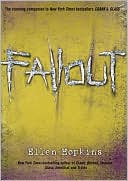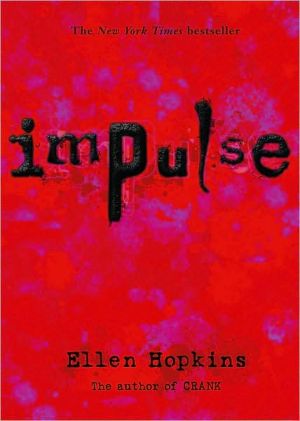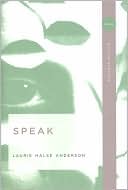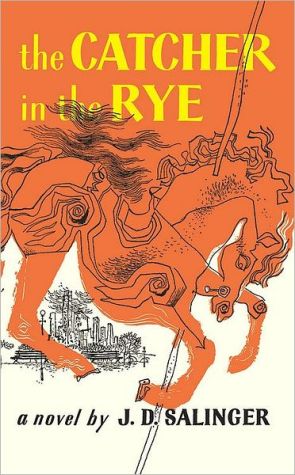Wintergirls
The New York Times bestselling story of a friendship frozen between life and death\ Lia and Cassie are best friends, wintergirls frozen in fragile bodies, competitors in a deadly contest to see who can be the thinnest. But then Cassie suffers the ultimate loss-her life-and Lia is left behind, haunted by her friend's memory and racked with guilt for not being able to help save her. In her most powerfully moving novel since Speak, award-winning author Laurie Halse Anderson explores Lia's...
Search in google:
“Dead girl walking,” the boys say in the halls. “Tell us your secret,” the girls whisper, one toilet to another. I am that girl. I am the space between my thighs, daylight shining through. I am the bones they want, wired on a porcelain frame. Lia and Cassie are best friends, wintergirls frozen in matchstick bodies, competitors in a deadly contest to see who can be the skinniest. But what comes after size zero and size double-zero? When Cassie succumbs to the demons within, Lia feels she is being haunted by her friend's restless spirit. In her most emotionally wrenching, lyrically written book since the multiple-award-winning Speak, Laurie Halse Anderson explores Lia's descent into the powerful vortex of anorexia, and her painful path toward recovery.The Washington Post - Nora KrugAnderson…isn't a scaremonger or a schoolmarm. "I never set out to send messages," she has said. "I set out to tell a good story." In Wintergirls, she has done just that. Lia's tale is both painful to read and riveting. Unfortunately, many young women will relate to her despair, and if the novel helps them find solace or hope, all the better. Same goes for their parents.
\ Children's Literature - Julia Oltmann\ Cassie and Lia are best friends and have been since elementary school. As they grow up, they both develop serious eating disorders and eventually become competitive over who can get the thinnest. Their diseases spiral out of control, causing their friendship to end badly with Cassie judging Lia harshly. One night, months later, Lia receives thirty-three phone calls from Cassie— but she doesn't answer because of lingering resentment. The next day, Lia learns that Cassie was found dead in a motel room. From there, the story outlines Lia's emotional battle with guilt and how she attempts to deal with it. Anderson's unique use of language gives the reader an insight into Lia's thoughts and feelings; her torment is demonstrated through cross-outs, italics, and blank spaces. The first-person narrative allows the reader to identify personally with Lia, which is appropriate for a young adult audience and helpful in understanding her character. The dangers and severity of eating disorders are portrayed in a dark yet enlightening way. Overall, this book is a moving account of a teenager's life and struggle to find herself after losing a friend. Reviewer: Julia Oltmann\ \ \ \ \ Nora KrugAnderson…isn't a scaremonger or a schoolmarm. "I never set out to send messages," she has said. "I set out to tell a good story." In Wintergirls, she has done just that. Lia's tale is both painful to read and riveting. Unfortunately, many young women will relate to her despair, and if the novel helps them find solace or hope, all the better. Same goes for their parents.\ —The Washington Post\ \ \ Barbara FeinbergAnderson, the author of Speak and other award-winning novels for teenagers, has written a fearless, riveting account of a young woman in the grip of a deadly illness.\ —The New York Times\ \ \ \ \ Publishers WeeklyAcute anorexia, self-mutilation, dysfunctional families and the death of a childhood friend-returning to psychological minefields akin to those explored in Speak, Anderson delivers a harrowing story overlaid with a trace of mysticism. The book begins as Lia learns that her estranged best friend, Cassie, has been found dead in a motel room; Lia tells no one that, after six months of silence, Cassie called her 33 times just two days earlier, and that Lia didn't pick up even once. With Lia as narrator, Anderson shows readers how anorexia comes to dominate the lives of those who suffer from it (here, both Lia and Cassie), even to the point of fueling intense competition between sufferers. The author sets up Lia's history convincingly and with enviable economy-her driven mother is "Mom Dr. Marrigan," while her stepmother's values are summed up with a précis of her stepsister's agenda: "Third grade is not too young for enrichment, you know." This sturdy foundation supports riskier elements: subtle references to the myth of Persephone and a crucial plot line involving Cassie's ghost and its appearances to Lia. As difficult as reading this novel can be, it is more difficult to put down. Ages 12-up. (Mar.)\ Copyright © Reed Business Information, a division of Reed Elsevier Inc. All rights reserved.\ \ \ \ \ BCCBReaders will be absorbed by this gripping tale . . . starred review\ \ \ \ \ BooklistAnderson illuminates a dark but utterly realistic world . . . this is necessary reading. Starred review\ \ \ \ \ Children's LiteratureEighteen-year-old anorexic Lia is already emotionally fragile when she learns that Cassie, her former best friend, has died. Cassie died alone in a motel room and Lia had let the thirty-three incoming calls from her go unanswered that night. Now Lia feels guilty and starts seeing Cassie everywhere, haunting her, talking to her, encouraging her to push her eating disorder as far as her body will take it. Lia notes every calorie she eats, exercises long hours into the night, and sees herself not as sick but as strong. Already hospitalized twice for her anorexia, Lia knows how to trick her family into thinking she is making progress, all the while fading away right in front of them. At five feet five inches tall, Lia weighs ninety-nine pounds and hopes to get down to eighty-five, knowing it will make her want to be seventy-five. Her illness and her struggle over Cassie's death threaten to push her past the point of return. Anderson has created a haunting and startling narrator in Lia, who drags the reader right into the vortex of her constantly spinning mind, her narration shifting between poetic and manic. Lia's agonizing battle with food, her family issues, old memories, and self-mutilation episodes are often difficult to read but also make the book impossible to put down. Fans of Anderson's previous books may find this her most moving, complex, powerful, and important book yet. Cassie may haunt Lia, but Lia will surely haunt readers long after they finish this book. Reviewer: Amanda MacGregor\ \ \ \ \ School Library JournalGr 8 Up—After the death of her former best friend Cassie, 18-year-old Lia slowly spirals toward her own death, drowning in guilt while starving, cutting, and running on a treadmill in the middle of the night in this emotional novel (Viking, 2009) by Laurie Halse Anderson, winner of the 2009 Margaret A. Edwards Award. Her father is in denial and her mother is distant; her stepmother and little sister look on helplessly. Lyrically visual, this starkly truthful and chilling first-person tale is narrated convincingly by Jeannie Stith, who perfectly mimics the sarcasm and angst of a teen girl's struggle with anorexia. An interview with the author concludes the audiobook. Recommended for Anderson's fans and those who enjoy books by Sonya Sones and Ellen Hokins.—Terry Ann Lawler, Phoenix Public Library, AZ\ \ \ \ \ Kirkus ReviewsNeither therapy nor threats nor her ex-best friend's death can turn Lia away from her habits of cutting and self-starvation. In broken, symbolic and gut-wrenching prose, Lia narrates her hopeless story of the destructive behaviors that control her every action and thought. She lives for both the thrill and the crash of not eating, and any progress she may have made toward normal eating is erased when her former best friend Cassie dies alone in a hotel room. The trauma of Cassie's death coupled with Lia's strained relationship with her parents and stepmother makes her tighten her focus on not eating as she slides into a world of starvation-induced hallucinations. Uncontrollable self-accusations ("Stupid/ugly/stupid/bitch/stupid/fat") and compulsive calorie counts punctuate her claustrophobic account, which she edits chillingly to control her world. Anderson perfectly captures the isolation and motivations of the anorexic without ever suggesting that depression and eating disorders are simply things to "get over." Due to the author's and the subject's popularity, this should be a much-discussed book, which rises far above the standard problem novel. (Fiction. YA)\ \








